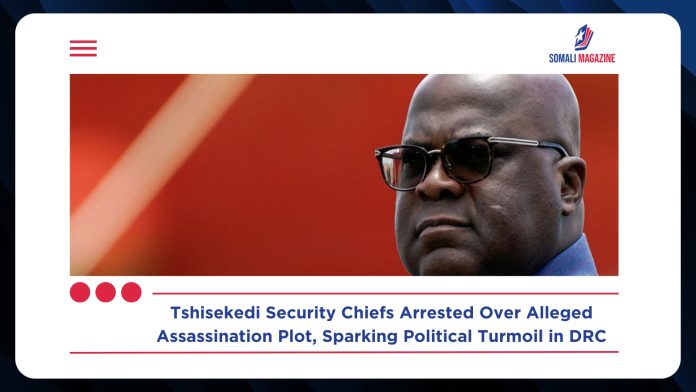Facebook Twitter (X) Instagram Somali Magazine - People's Magazine
Tshisekedi security chiefs detained in ‘assassination plot’ probe, sending shockwaves through the Democratic Republic of Congo (DRC) as senior military officials face accusations of conspiring to assassinate President Félix Tshisekedi. The arrests, which include former army chief of staff Christian Tshiwewe and presidential security head Franck Ntumba, have ignited fears of internal instability and raised questions about loyalty within the country’s top security ranks.
General Tshiwewe, who served as army chief until December 2024 before becoming a presidential adviser, was arrested earlier this month following allegations made by the ruling Union for Democracy and Social Progress (UDPS) party. UDPS Secretary-General Augustin Kabuya claimed that Tshiwewe confessed during interrogation to plotting the president’s assassination, describing the situation as “more serious than many realise.”
The arrest of Ntumba, who led the president’s personal security detail, is reportedly linked to warnings issued by Israeli and American intelligence agencies earlier this year. According to sources, Israeli-American businessman Moti Kahana met President Tshisekedi at the World Economic Forum in Davos and handed him a list of alleged coup plotters. The names reportedly included Ntumba, prompting heightened surveillance and eventual detention.
The Congolese army has yet to issue a formal statement on the arrests, but FARDC spokesperson Maj-Gen Sylvain Ekenge confirmed that the officers were detained for “serious breaches” of military discipline. He dismissed claims of ethnic targeting, stating that each officer was arrested based on individual misconduct, not community affiliation.
The arrests have sparked political tension, especially amid growing friction between Tshisekedi and former President Joseph Kabila. Analysts warn that the detentions could deepen divisions within the military and fuel speculation of factionalism. The DRC has a history of political violence, including the 2001 assassination of President Laurent-Désiré Kabila, and the current developments have revived fears of a repeat scenario.
The situation is further complicated by the presence of foreign actors. Three American citizens were sentenced to death in September 2024 for their role in a failed coup attempt in May of that year. Efforts by both the Biden and Trump administrations to secure their release have stalled, adding a layer of diplomatic tension to the unfolding crisis.
Security has been tightened around key government installations, and surveillance of military personnel has increased. The Ministry of Defence is reportedly restructuring command positions to prevent further insubordination. Meanwhile, civil society groups are calling for transparency and due process, urging the government to avoid politicising the judiciary.
President Tshisekedi has remained largely silent on the matter, but insiders say he views the arrests as necessary to safeguard national stability. His administration is expected to announce further reforms aimed at strengthening internal security and restoring public trust in the armed forces.
As the DRC prepares for its next electoral cycle, the fallout from the alleged assassination plot could shape the political landscape. Whether the arrests lead to justice or deepen mistrust will depend on how the government handles the investigation and communicates with the public.

